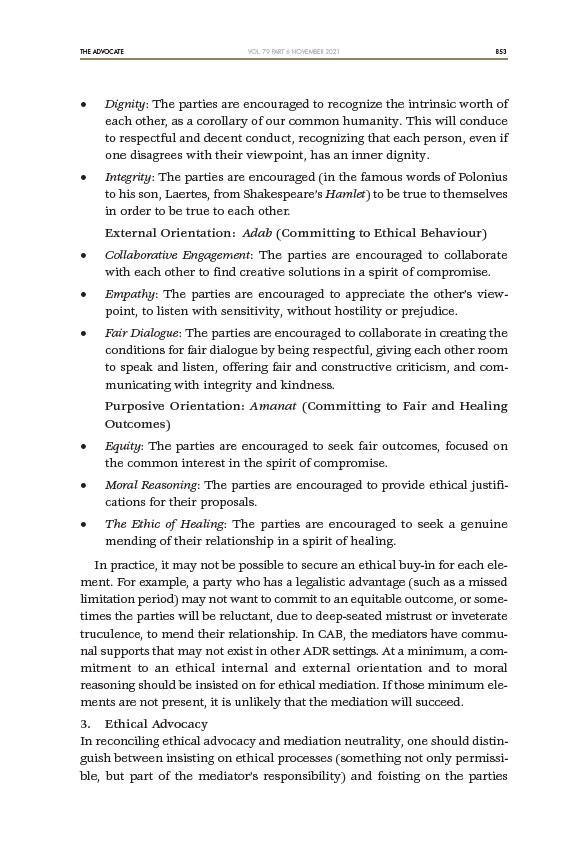
THE ADVOCATE 853
VOL. 79 PART 6 NOVEMBER 2021
• Dignity: The parties are encouraged to recognize the intrinsic worth of
each other, as a corollary of our common humanity. This will conduce
to respectful and decent conduct, recognizing that each person, even if
one disagrees with their viewpoint, has an inner dignity.
• Integrity: The parties are encouraged (in the famous words of Polonius
to his son, Laertes, from Shakespeare’s Hamlet) to be true to themselves
in order to be true to each other.
External Orientation: Adab (Committing to Ethical Behaviour)
• Collaborative Engagement: The parties are encouraged to collaborate
with each other to find creative solutions in a spirit of compromise.
• Empathy: The parties are encouraged to appreciate the other’s viewpoint,
to listen with sensitivity, without hostility or prejudice.
• Fair Dialogue: The parties are encouraged to collaborate in creating the
conditions for fair dialogue by being respectful, giving each other room
to speak and listen, offering fair and constructive criticism, and communicating
with integrity and kindness.
Purposive Orientation: Amanat (Committing to Fair and Healing
Outcomes)
• Equity: The parties are encouraged to seek fair outcomes, focused on
the common interest in the spirit of compromise.
• Moral Reasoning: The parties are encouraged to provide ethical justifications
for their proposals.
• The Ethic of Healing: The parties are encouraged to seek a genuine
mending of their relationship in a spirit of healing.
In practice, it may not be possible to secure an ethical buy-in for each element.
For example, a party who has a legalistic advantage (such as a missed
limitation period) may not want to commit to an equitable outcome, or sometimes
the parties will be reluctant, due to deep-seated mistrust or inveterate
truculence, to mend their relationship. In CAB, the mediators have communal
supports that may not exist in other ADR settings. At a minimum, a commitment
to an ethical internal and external orientation and to moral
reasoning should be insisted on for ethical mediation. If those minimum elements
are not present, it is unlikely that the mediation will succeed.
3. Ethical Advocacy
In reconciling ethical advocacy and mediation neutrality, one should distinguish
between insisting on ethical processes (something not only permissible,
but part of the mediator’s responsibility) and foisting on the parties